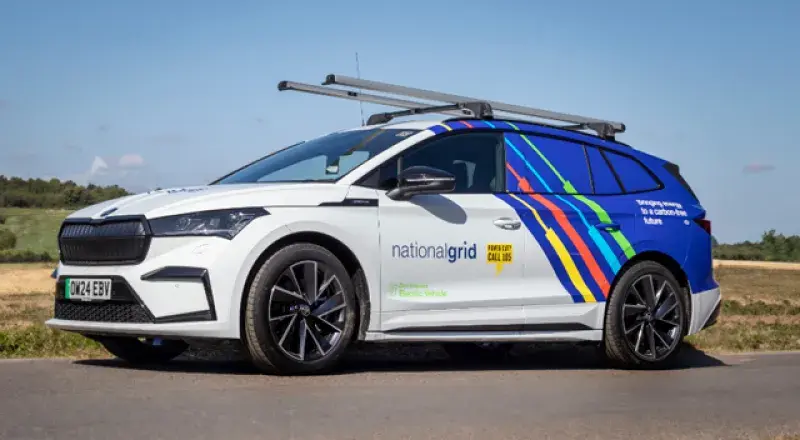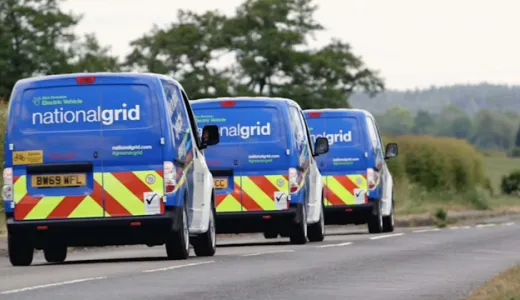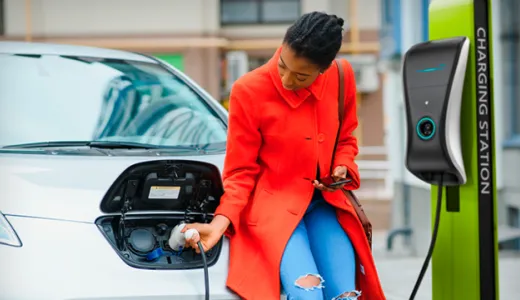With around half of all vehicles on the road globally being operated by businesses, large corporations like us have a key role to play in the wider transition to electric vehicles (EVs).
We have over 1,000 EVs in our UK Electricity Transmission fleet alone, with an additional 175 in the US. In both countries we have made a commitment to move to a 100% electric fleet by 2030 for our light-duty vehicles.
The transition to electric vehicles is a significant component in the race to net zero and our efforts to transform our energy systems mean that we play a key role in facilitating this.
For this reason, we’re determined to lead by example in electrifying our own fleet – championing the wider uptake of EVs among the communities we serve, so we can build a more sustainable future together.
Decarbonising the fleet industry for a net zero future
Over half of all new vehicles on the road go into company fleets, so it’s crucial that businesses lead the shift to EVs through their investment decisions and influence on millions of staff and customers worldwide.
As part of our commitment to integrate EVs into our fleet and support EV uptake within our own workforce, we sit on the council for the Zemo Partnership, which brings government, industry and experts together with one ultimate aim – to accelerate transport to zero emissions.
We’ve also made a commitment for 289 charging sites in the UK, and to add a further 2,900 owned-chargers for our internal fleets to the 1,400 points already deployed in our US territories.
It’s vital we keep leading the way through the transformation of our own fleet...
Lorna McAtear, our UK electricity transmission fleet manager and also the vice chair of the Zemo council, says: “There’s huge potential to drive net zero ambitions by transforming the fleet industry to electric vehicles. Viable electric cars and vans weren’t around eight years ago and it’s exciting to see the progress that’s being made to find feasible solutions in the market.
“It’s vital we keep leading the way through the transformation of our own fleet, helping to influence the transport and energy sectors alongside government with the changes needed.”
We’re proud to be working with global businesses leaders to influence policy and support the mass roll-out of EVs – this will be critical to cutting carbon emissions and reaching the government’s ambitious climate goals.
Tackling climate change
Transportation is the largest emitting sector of greenhouse gas emissions (GHG) in both the UK and the Northeast US. Globally, transport – including mobility from land, air and sea – accounted for approximately 16% of global GHG emission in 2023, producing roughly 8.4 billion metric tons of carbon dioxide equivalent.1
Tackling climate change and reaching net zero will require a range of technologies and solutions across different sectors and industries. The mass adoption of electric vehicles will be key to decarbonising our roads, with estimates we’ll have over 11 million EVs on the road in the UK and 18.7 million on the road in the US by 2030.
We’re seeing an acceleration in this space with the UK government’s ban on new petrol and diesel cars by 2035. Steps are also being taken in the US, with both Massachusetts and New York having adopted the Advanced Clean Cars II (ACC) rule, which requires auto manufacturers to ensure that every new light-duty car sold in each state is a zero-emission vehicle by 2035.
Transitioning our fleet to EVs
To support these ambitions, businesses have a critical role to play in leading by example and encouraging an uptake of EVs within their own fleets.
In the UK…
…we’ve made a commitment to replace our entire commercial fleet with alternative fuel, zero-emission vehicles by 2030 and we’re on target to reach a 60% electrification of our fleet by the end of the 2025/26 financial year.
Ultimately, our aim is to transition our fleet to net zero and help accelerate the wider decarbonisation of transport in the UK.
In the US…
…we operate 50 medium and heavy-duty electrified vehicles and over 100 EV forklifts, while continuing to replace our light-duty fleet with EVs. We've completed and continue to run pilots on new electrified construction equipment and other technologies to further reduce emissions.
We’ve also committed to move to a 100% electric fleet by 2030 for our light-duty vehicles and pursue the replacement of our medium- and heavy-duty vehicles with zero carbon alternatives.

New 4x4 EV in partnership with Skoda
A new, fully electric 4x4 utility vehicle is joining our UK Electricity Distribution transport fleet, after a collaborative project with Skoda and vehicle conversion company Strongs to convert Skoda’s road car Enyaq into a light commercial vehicle with all-terrain capability.
Supporting EV uptake among our workforce
We’re also committed to enabling our employees to take part in this future of clean transportation by, for example, installing charging facilities at our premises and providing incentives for our employees towards the purchase or lease of EVs.
At our offices in Warwick, UK, we provide a fully electric, zero-emission shuttlebus for colleagues. This free service, which operates between Leamington Spa town centre, the train station and our office, covers around 50,000km on the route annually, resulting in savings of nearly 30 tonnes of CO2 per year.
Find out more about electric vehicles
Published: 29 Oct 2024
The information in this article is intended as a factual explainer and does not necessarily reflect National Grid's strategic direction or current business activities.
Electric vehicles and the journey to net zero
Electric vehicles (EVs) are growing in popularity across the globe and are instrumental in helping to reduce global carbon emissions and reach net zero. But there are still many uncertainties and even misconceptions about their capabilities. Find out more.




